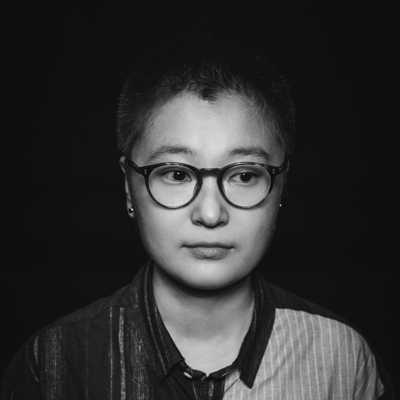 Seol Youjin
Seol YoujinPlaywright, Director
2021 <Tale of Hong Pyeong Guk>
2020 <The 4th Wall>, <First time>, <Walk around>
2019 <September>, <907 Single Act Theater_ Apple tree, I’m here on the floor, Miss you>, <Miss you>, <Tale of Hong Gye Wol>
2018 <You, I love>, <September>, <Here on the floor>
2017 <Door bell>, <Face>, <On the ground>
2016 <Elephant tomb>, <The Wall>, <Door bell>
Director
2020 <McGuffin>, <American Theater/Seoul Chorus>
2019 <Lemon Cider Summer Clean Shot>, <To You>, <Never dry, Clear, Obscure>
2018 <Someone’s Flower garden>
Playwright
2015 <Wrestling>

Jury’s Statement
Today, the stage of a theater is no longer a simple story box. Instead, the stage is a space of endless possibilities depending on how it is divided or unified in relation to the actors (especially their bodies and voices) and the interplay of music and lighting. This [aspect of the stage] seems to be the very factor that determines the characteristics of contemporary theater and the aesthetics that today’s theater directors pursue. Here, which subject or narrative the director chooses to bring to light, of all humanly and worldly affairs, is still a matter worthy of attention. However, the methodology that the director applies to deliver the stories, namely the way that each medium is used on stage to create the apposite texture and rhythm and the way that the narrative is delivered (sensually or dynamically) to the audience, must be the more reliable basis upon which one can assess the director’s unique perspective. The director never simply “employs” each stage element—actors, music, lighting, and props—as a vessel of theatrical language. Rather, the director delves into and challenges the conventional framework assigned to each element and, at times, builds on that analysis to reconstruct the stage anew into a multi-sensory space.
This [role of the director] is what establishes the theatrical foundation for Youjin Seol, an actively showing stage director and playwright. When directing a play, Seol eliminates existing traits of the theater as much as possible before arranging actors, sound, light, and objects in a completely new and original way. For instance, in September (2019), as little as two white lines on the stage floor and chairs conveyed the spatiality and temporal rhythm of a train station, where numerous people arrive, linger, and depart. In To You (2019), the emptied and maximized stage embraced by partial lighting transformed the theater into a womb-like space. In Lemon Soda Summer Clean-shot (2019), the theater itself was converted into a basketball stadium. Lastly, in The 4th Wall (2020) and Tale of Hong Pyeong Guk (2021), traces that could hint at the play’s narrative were removed from the stage to make it a strictly neutral and empty arena. More than that, the seats were installed in the center of the stage so that the actors would perform the stories while circumambulating the audience. In spaces emptied and reestablished like this, the actors’ movement and speech, light, and sound each have a unique presence. In particular, regardless of the actors’ roles, whether they are basketball players or warriors, their speech and bodily movements transcend the dialogue of the play and become interactions with the audience in the space, creating a new dynamic (a type of synchronization) between the theater and the world outside of it.
However, the diverse theatrical expressions do not originate solely from Youjin Seol’s ideations as a director. From the moment Seol faces the stage as a director with a script at hand, Seol begins to consult the actors and attune the play’s direction to the input. This approach may seem confusing or tedious at times, but it is a highly productive process in directing a play as it allows for the director, actors, and staff members to explore one another’s varying languages and actively find points of connection. This [inclusive process] is why, after all, the audience leaves Youjin Seol’s play with a long-lasting impression of the actors, the sounds, or maybe even different lights on the stage.
Tale of Hong Pyeong Guk, Seol’s play that premiered this year, is a remarkable piece that demonstrates the director’s exceptional insight in selecting and creatively adapting an original work that fits well with her own values and style as well as utilizing the stage so that it extends beyond its physical limitations. In this play, the protagonist Hong Pyeong Guk is a character who was born a woman but lives the life of a male war hero. The fact that Hong Pyeong Guk and other male characters in the narrative are played by female actors shatters banal gender stereotypes. The gender-neutral and distanced portrayal of the character Hong Gye Wol/ Hong Pyeong Guk by the six actors including Soon mi Hwang, Bo eun Kim, and So young Ra effectively delivers the character’s story vertically and horizontally in the space and time of the theater. Moreover, the textures of the lighting and music that saturate the church, and, above all, the daylight that floods into the space through its windows, all contribute to the setting of the play with unique materiality.
Even in the challenging environment for artistic practices, Youjin Seol kept at work and accomplished a prominent voice in the performing arts. The jury intently anticipates Seol’s continued growth for the following five, even ten, years. The jury believes that Seol’s practice will set a meaningful precedent and become a driving force in the discipline of Performing Arts in South Korea.
_Jury: Mi-do Kim, Hansol Yoon, Kyung-mi Lee